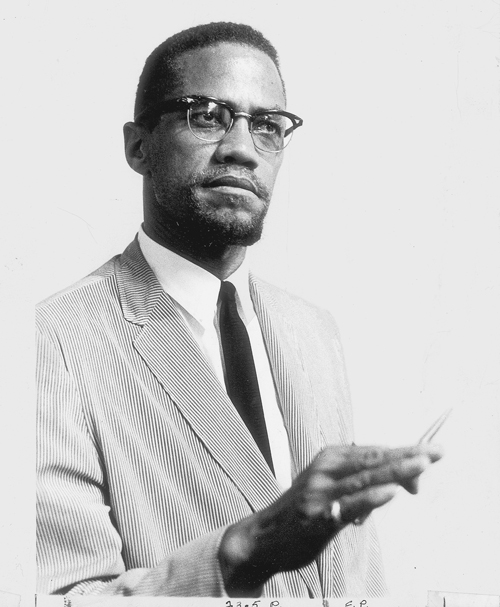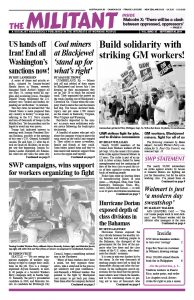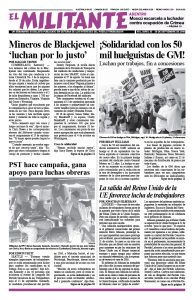
Malcolm X Speaks is one of Pathfinder’s Books of the Month for September. Malcolm broke from the Nation of Islam, headed by Elijah Muhammad, to become the outstanding leader of the struggle for Black liberation in the United States in the early 1960s. The excerpts below, from the chapter “Last Answers and Interviews,” were given in the final months of Malcolm’s life. Copyright © 1965. Reprinted by permission of Pathfinder Press.
MALCOLM: The only person who can organize the man in the street is the one who is unacceptable to the white community. They don’t trust the other kind. They don’t know who controls his actions. …
Marlene Nadle asked if he planned to use hate to organize the people.
MALCOLM: I won’t permit you to call it hate. Let’s say I’m going to create an awareness of what has been done to them. This awareness will produce an abundance of energy, both negative and positive, that can then be channeled constructively. …
The greatest mistake of the movement has been trying to organize a sleeping people around specific goals. You have to wake the people up first, then you’ll get action.
MARLENE NADLE: Wake them up to their exploitation?
MALCOLM: No, to their humanity, to their own worth, and to their heritage.
From Marlene Nadle’s article,
Village Voice,
February 25, 1965
QUESTION: What is your opinion of the world-wide struggle now going on between capitalism and socialism?
MALCOLM: It is impossible for capitalism to survive, primarily because the system of capitalism needs some blood to suck. Capitalism used to be like an eagle, but now it’s more like a vulture. It used to be strong enough to go and suck anybody’s blood whether they were strong or not. But now it has become more cowardly, like the vulture, and it can only suck the blood of the helpless. As the nations of the world free themselves, then capitalism has less victims, less to suck, and it becomes weaker and weaker. It’s only a matter of time in my opinion before it will collapse completely.
From interview,
Young Socialist,
March–April, 1965
Malcolm was asked about the outcome of the recent presidential election in the United States.
MALCOLM: It isn’t a president who can help or hurt; it is the system. And this system is not only ruling us in America, it is ruling the world. Nowadays, when a man is running for president of the United States, he is not running for president of the United States alone; he has to be acceptable to other areas of the world where American influence rules.
If Johnson had been running all by himself, he would not have been acceptable to anyone. The only thing that made him acceptable to the world was that the shrewd capitalists, the shrewd imperialists, knew that the only way people would run toward the fox would be if you showed them a wolf. So they created a ghastly alternative. And it had the whole world — including people who call themselves Marxists — hoping that Johnson would beat Goldwater.
I have to say this: Those who claim to be enemies of the system were on their hands and knees waiting for Johnson to get elected — because he is supposed to be a man of peace. And at that moment he had troops invading the Congo and South Vietnam!
Answer to question,
Presence Africaine meeting, Paris,
November 23, 1964
QUESTION: How do you define black nationalism, with which you have been identified?
MALCOLM: I used to define black nationalism as the idea that the black man should control the economy of his community, the politics of his community, and so forth.
But, when I was in Africa in May, in Ghana, I was speaking with the Algerian ambassador who is extremely militant and is a revolutionary in the true sense of the word (and has his credentials as such for having carried on a successful revolution against oppression in his country). When I told him that my political, social and economic philosophy was black nationalism, he asked me very frankly, well, where did that leave him? Because he was white. He was an African, but he was Algerian, and to all appearances he was a white man. And he said if I define my objective as the victory of black nationalism, where does that leave him? Where does that leave revolutionaries in Morocco, Egypt, Iraq, Mauritania? So he showed me where I was alienating people who were true revolutionaries, dedicated to overturning the system of exploitation that exists on this earth by any means necessary.
So, I had to do a lot of thinking and reappraising of my definition of black nationalism. Can we sum up the solution to the problems confronting our people as black nationalism? And if you notice, I haven’t been using the expression for several months. But I still would be hard pressed to give a specific definition of the over-all philosophy which I think is necessary for the liberation of the black people in this country.
From interview,
Young Socialist,
March–April, 1965
PIERRE BERTON: There has been talk, I think by you, by Elijah Muhammad, about an Armageddon in the United States by 1984. I’m wondering if you still believe that, and why that particular date?
MALCOLM: Much of what Elijah Muhammad has taught, I don’t think he believes in himself; and I say that and can easily defend it sitting opposite him. But where an ultimate clash between East and West is concerned, I think that an objective analysis of events that are taking place on this earth today points toward some type of ultimate showdown.
You can call it a political showdown, or even a showdown between the economic systems that exist on this earth which almost boil down along racial lines. I do believe that there will be a clash between East and West.
I believe that there will ultimately be a clash between the oppressed and those that do the oppressing. I believe that there will be a clash between those who want freedom, justice and equality for everyone and those who want to continue the systems of exploitation. I believe that there will be that kind of clash, but I don’t think that it will be based upon the color of the skin, as Elijah Muhammad had taught it.
From interview on
Pierre Berton Show,
January 19, 1965

